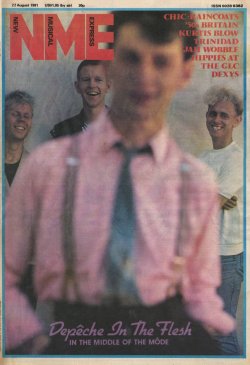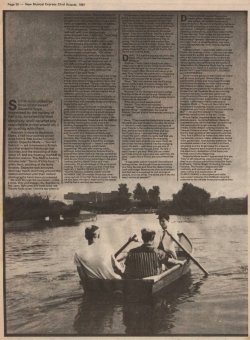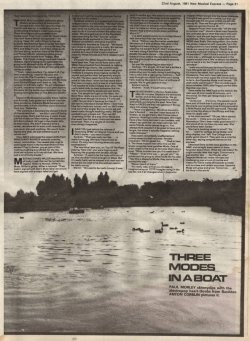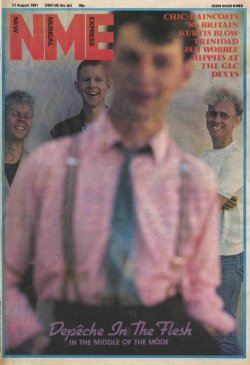Three Modes In A Boat
[NME, 22nd August 1981. Words: Paul Morley. Pictures: Anton Corbijn.]



THREE MODES IN A BOAT
So I’m surrounded by three of the sweet Depeche boys, impressed by the variety of their haircuts, surprised by their simplicity, and I do what any responsible writer would do. I go boating with them.
Basildon is close to Southend, Essex, a half hour journey on old stock from a little-known London station. Depeche Mode – “hurried fashion” – are in between a British tour that ended in Edinburgh last Saturday and the recording of their debut LP, and are meeting the NME at Basildon station. The NME is twenty minutes late! “Sorry, it’s his fault,” I glibly blurt, pointing at the lanky lensboy. Depeche look annoyed, don’t say much, and hang around the station entrance until their instant photographs have been processed.
We walk through the new town: unlike a close, dirty and snaggy city, Basildon is flat, open light grey and fresh brick red. The sky looks close. I bet the tap water is moderately drinkable. We stroll past the square shopping centre, probably a local attraction for the postcards, cross a busy dual carriageway, an odd sign of speed, towards the indoor swimming pool.
“A lot of people,” Andrew Fletcher – a redhead, with new, dangerously close-cropped hair – tells me, “think that Basildon is a little country village.” Thatched roofs and jukebox-less pubs. “In fact it has a population of 180,000,” Martin Gore – derelict blond curls, a couple of days’ tender fluff on the chin – affectionately mocks him. “Oh, Andy knows everything, even the population.”
“Believe me,” continues Andrew earnestly, “It’s got an electoral roll of 107,000 and that’s not including kids. That’s the biggest in the country, and next time it has got to be split up into Basildon East and West.”
Have you lived in Basildon long? I ask singer Dave Gahan – black hair with a strange lie and an abbreviated fringe pointing down the centre of the forehead. “Since I was four,” he says. Depeche Mode are the formalist tingling sound of young Basildon, the alert geometric sound of the new town, the soundtrack for all cosmetic optimism, an evocative representation of the functional artificiality of some environment. Sunshine suits Basildon, all interviews with Depeche Mode should take place in the open air.
The Swimming Pool is set in a small tidy park: next to the swimming pool is a boating pool, near the boating pool is a putting green. Teenyboppers on school-holiday burn their legs in the sun and look numbly happy in the peace and slowness. Depeche and the NME sit on strictly mown grass under a toy tree; missing is songwriter Vince Clarke, who from past interviews appears to be the most prepared to attempt to rationalise the anti-romantic anti-intellectual Mode pop.
“There was a guy who interviewed us for the Daily Star, Ricky Sky, and he was desperately looking for a headline, an angle, and he was saying to us – haven’t you done anything really exciting, what’s been happening? We said well nothing really, although when we played at Ronnie Scott’s once all the lights went out! He was excited by this, then he started to talk about looks and he said do you think it’s an advantage to be good looking and in a band? Vince said Yeah, obviously, it’s an advantage in life to be good looking. Rick Sky made it out that Vince had said UGLY BANDS NEVER MAKE IT, IF YOU’RE GOOD LOOKING THEN YOU’RE NUMBER ONE. Since then Vince has never ventured out of his flat! He is so upset. It really hit him hard. He hasn’t been out for six weeks and he had a real bad depression.”
At the station I felt that Depeche Mode were going to be surly and silent: pop technicians simplifying their calculated art so that it fits into “the interview”. Actually, they like talking: what they like talking about most is nothing in particular. There is a residue of scurrilous schoolboy values, an innocently mutinous streak. They’re in no hurry: they’ve a cheerily vague idea about where they’ve been, and aren’t too concerned about where they’re going. Yet! Tomorrow is just another day: yesterday was a bit of a laugh. Today: flick the switch, talk to the man, fiddle with pieces of grass. Depeche Pop: for all the time in the world and no time at all.
[NME, 22nd August 1981. Words: Paul Morley. Pictures: Anton Corbijn.]
In probably the first critical piece written about Depeche Mode, Paul Morley spends a lazy afternoon interviewing the band (no Vince) and catching their first dazed reactions to sudden fame. Morley is refreshed by their simplicity and lack of self-consciousness, although at times perhaps reads more into their music than is there. Heavy going in places, but rewarding... and look who the photographer is!
" They find it difficult to frame their new fame. Ingredients, colours, ideas, references, styles were generously, haphazardly scattered: the accidental pattern that’s formed is brilliant, attractive and the bright basis for a special design. Depeche are a supreme example of the electronic vitalisation of the basic pop format, and it’s the beginning. "
Summary: In probably the first critical piece written about Depeche Mode, Paul Morley spends a lazy afternoon interviewing the band (no Vince) and catching their first dazed reactions to sudden fame. Morley is refreshed by their simplicity and lack of self-consciousness, although at times perhaps reads more into their music than is there. Heavy going in places, but rewarding... and look who the photographer is! [3309 words]



THREE MODES IN A BOAT
So I’m surrounded by three of the sweet Depeche boys, impressed by the variety of their haircuts, surprised by their simplicity, and I do what any responsible writer would do. I go boating with them.
Basildon is close to Southend, Essex, a half hour journey on old stock from a little-known London station. Depeche Mode – “hurried fashion” – are in between a British tour that ended in Edinburgh last Saturday and the recording of their debut LP, and are meeting the NME at Basildon station. The NME is twenty minutes late! “Sorry, it’s his fault,” I glibly blurt, pointing at the lanky lensboy. Depeche look annoyed, don’t say much, and hang around the station entrance until their instant photographs have been processed.
We walk through the new town: unlike a close, dirty and snaggy city, Basildon is flat, open light grey and fresh brick red. The sky looks close. I bet the tap water is moderately drinkable. We stroll past the square shopping centre, probably a local attraction for the postcards, cross a busy dual carriageway, an odd sign of speed, towards the indoor swimming pool.
“A lot of people,” Andrew Fletcher – a redhead, with new, dangerously close-cropped hair – tells me, “think that Basildon is a little country village.” Thatched roofs and jukebox-less pubs. “In fact it has a population of 180,000,” Martin Gore – derelict blond curls, a couple of days’ tender fluff on the chin – affectionately mocks him. “Oh, Andy knows everything, even the population.”
“Believe me,” continues Andrew earnestly, “It’s got an electoral roll of 107,000 and that’s not including kids. That’s the biggest in the country, and next time it has got to be split up into Basildon East and West.”
Have you lived in Basildon long? I ask singer Dave Gahan – black hair with a strange lie and an abbreviated fringe pointing down the centre of the forehead. “Since I was four,” he says. Depeche Mode are the formalist tingling sound of young Basildon, the alert geometric sound of the new town, the soundtrack for all cosmetic optimism, an evocative representation of the functional artificiality of some environment. Sunshine suits Basildon, all interviews with Depeche Mode should take place in the open air.
The Swimming Pool is set in a small tidy park: next to the swimming pool is a boating pool, near the boating pool is a putting green. Teenyboppers on school-holiday burn their legs in the sun and look numbly happy in the peace and slowness. Depeche and the NME sit on strictly mown grass under a toy tree; missing is songwriter Vince Clarke, who from past interviews appears to be the most prepared to attempt to rationalise the anti-romantic anti-intellectual Mode pop.
“There was a guy who interviewed us for the Daily Star, Ricky Sky, and he was desperately looking for a headline, an angle, and he was saying to us – haven’t you done anything really exciting, what’s been happening? We said well nothing really, although when we played at Ronnie Scott’s once all the lights went out! He was excited by this, then he started to talk about looks and he said do you think it’s an advantage to be good looking and in a band? Vince said Yeah, obviously, it’s an advantage in life to be good looking. Rick Sky made it out that Vince had said UGLY BANDS NEVER MAKE IT, IF YOU’RE GOOD LOOKING THEN YOU’RE NUMBER ONE. Since then Vince has never ventured out of his flat! He is so upset. It really hit him hard. He hasn’t been out for six weeks and he had a real bad depression.”
At the station I felt that Depeche Mode were going to be surly and silent: pop technicians simplifying their calculated art so that it fits into “the interview”. Actually, they like talking: what they like talking about most is nothing in particular. There is a residue of scurrilous schoolboy values, an innocently mutinous streak. They’re in no hurry: they’ve a cheerily vague idea about where they’ve been, and aren’t too concerned about where they’re going. Yet! Tomorrow is just another day: yesterday was a bit of a laugh. Today: flick the switch, talk to the man, fiddle with pieces of grass. Depeche Pop: for all the time in the world and no time at all.

